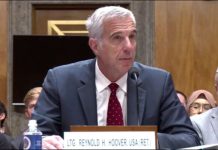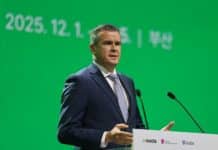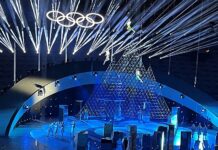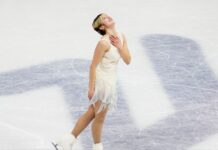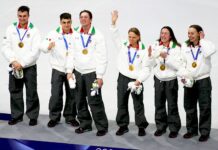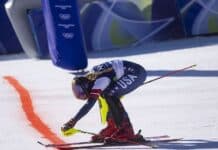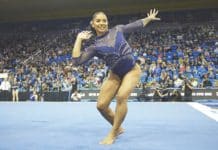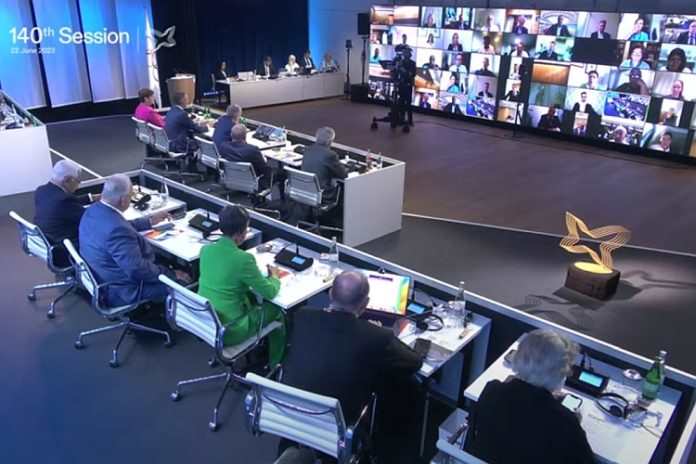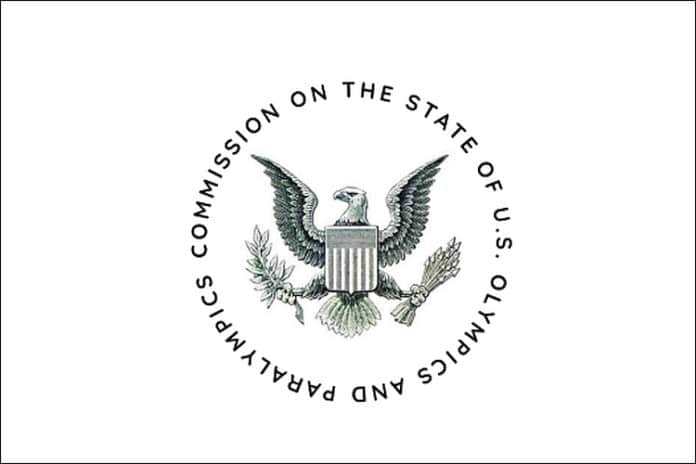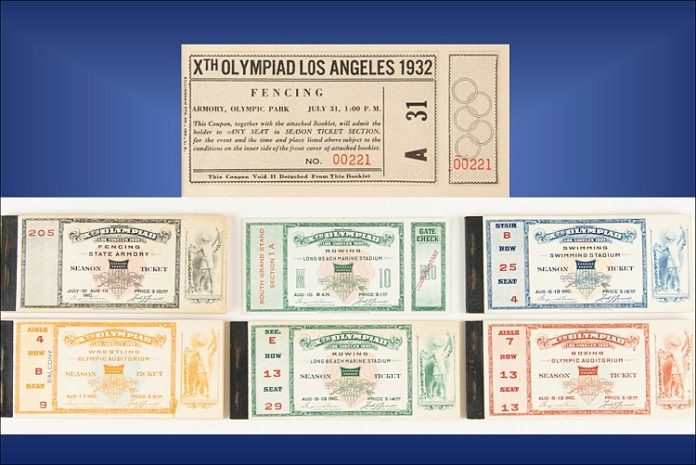★ The Sports Examiner: Chronicling the key competitive, economic and political forces shaping elite sport and the Olympic Movement.★
★ Thank you!: From just 13 donors, we are at 35% of our summer fund-raising goal. Can you help? Please donate here and now. Your support is crucial. ★
★ To get The Sports Examiner by e-mail: sign up here! ★
≡ THE 5-RING CIRCUS ≡
1. IOC ends recognition of IBA, 69-1; boxing in for 2024 and 2028
2. Bach speech rips both Russian and Ukrainian governments
3. IOC had $2.5 billion revenue in 2022, reserves of $3.6 billion
4. Valieva doping appeal hearing set for September
5. U.S. track stars falling out of love with Eugene
The International Olympic Committee expelled the International Boxing Association from the Olympic Movement on Thursday in a special, mostly-remotely-attended IOC Session, but confirmed that the sport will remain on the program for Paris in 2024 and Los Angeles in 2028. The IBA responded with its usual vitriol; the new World Boxing group promised to work with the IOC. IOC chief Thomas Bach gave an impassioned speech, praising those organizations which have followed the IOC recommendations and castigating both Russia and Ukraine for their unhappiness with the IOC’s “workable pathway.” The IOC also released its annual report, which showed total assets of $5.30 billion and reserves of $3.62 billion, with $2.36 billion in 2022 revenues. The U.S. Olympic & Paralympic Committee received $237.02 million. The Court of Arbitration for Sport finally announced the hearing dates for the appeal of the Kamila Valieva doping case from the 2022 Beijing Winter Games: 26-29 September, meaning the decision likely won’t come down until late in the year. The USA Track & Field National Championships will once again be in Eugene, Oregon this year, but some star athletes are tired of it and the associated costs of going into that small market. Tweeted Alaysha Johnson, the world’s fifth-fastest 100 m hurdles in 2023, “Much rather prefer to go… anywhere else actually.”
● Spotlight: Modern Pentathlon (UIPM says poll shows obstacle could add 45 million U.S. viewers to Olympics?!?) ●
● Panorama: Paris 2024 (2: Court of Audit still worried about Paris 2024 budget; sports management firm involved in the Paris bid also searched by authorities) = Milan Cortina 2026 (IOC approves new formats for Alpine Combined, others) = Olympic Winter Games 2030 (Better poll for Sapporo for 2030) = National Olympic Committees (IOC worried about Afghanistan) = Russia (BRICS Games coming in June ‘24) = Athletics (Mu opens season in New York Saturday on NBC) = Swimming (Remembering 50 years since East German doping took the sport over) = Volleyball (FIVB approves biennial Worlds for men and women beginning 2025!) ●
1.
IOC ends recognition of IBA, 69-1; boxing in for 2024 and 2028
There wasn’t much doubt of the outcome, but the International Olympic Committee made a clear statement against the International Boxing Association on Thursday by voting 69-1, with 10 abstentions, in favor of withdrawing recognition from the IBA as the governing body of boxing for the Olympic Games.
The IBA is out.
Thursday’s unusual 140th IOC Session, at which most of the members attended remotely, had 80 members present out of the 99 currently seated, or 81%. This constituted a valid quorum.
Beyond ex-communicating the IBA, the vote also gave Olympic boxing a major boost by (1) confirming its place at the Paris 2024 Olympic Games and (2) declaring that the IBA “should not organise the LA28 Olympic boxing tournament.”
IOC President Thomas Bach (GER) explained:
“To make it clear from the outset, we do not have a problem with the sport of boxing. We do not have a problem with the boxers. We appreciate boxing as one of the most global sports. We embrace the values of boxing, which are so evident in all countries, whether north or south, east or west, whether privileged or underprivileged.
“In all countries around the world, boxing plays an important social role, promoting inclusion and empowerment. We do not have a problem with the boxers. On the contrary, we appreciate the boxers for living these social values of their sport. If we would have a problem with the boxers, then there would not have been an Olympic competition in Tokyo. There would not have been qualifying events for Tokyo, because IBA was already suspended at that time.
“If we would have a problem with the boxers, then there would be no boxing competition in Paris. And no respective qualifying events, because the suspension of IBA is still in effect.
“We highly value the sport of boxing. But, unfortunately, as you have seen from the file – which you have already received and had a chance to study – you can see that we have an extremely serious problem with IBA, because of their governance.
“Because we value the sport of boxing so much, we believe that these athletes – the boxers – fully deserve to be governed by an International Federation with integrity and transparency. And this will be the focus of our discussions now.”
IOC Director General Christophe De Kepper (BEL) went even further in replying to questions from IOC members David Haggerty (USA) and Prince Albert (MON), stating:
“We can guarantee that boxing will be on the program in Paris and LA28, and I will ask Kit McConnell to explain to you a little the process and the technicalities.”
McConnell (NZL), the IOC’s Sports Director, detailed that the 2024 tournament will be run by the “Paris Boxing Unit,” which is modeled after the Tokyo 2020 tournament team, but with more independence from the IOC, and with refereeing and judging overseen by the international consulting firm, PWC.
The vote and de Kepper’s comments regarding 2028 removes one of the question marks for the Los Angeles organizers, still waiting for resolution on whether modern pentathlon and weightlifting will also be added back to the program. In the Los Angeles bid for 2028, the boxing venue was identified as one of the exhibition halls of the massive Los Angeles Convention Center in the downtown area.
¶
The IBA’s response was, as usual, vitriolic, including an astonishing reference to the Nazi invasion of the USSR in 1941, trying to frame Bach – a German – against the Russian president of the IBA, Umar Kemlev, in some sort of personal duel:
“Today, on 22 June 2023, the IOC has made a tremendous error by withdrawing its recognition of the IBA, revealing its true politicized nature. It is noteworthy that on this very day, 82 years ago, fascist Germany launched an attack on the peaceful citizens of the Soviet Union, resulting in the escalation of war and a devastating human tragedy. We cannot conceal the fact that today’s decision is catastrophic for global boxing and blatantly contradicts the IOC’s claims of acting in the best interests of boxing and athletes. …
“Although we have provided the IOC with all investigation reports, the IOC has failed to recognize the destructive actions of C.K. Wu, who led the International Boxing Association to bankruptcy, collapse, and corruption at all levels.”
The IBA then demanded the IOC respond to five questions, concerning Wu, why it has not responded to IBA in the way IBA finds acceptable, why it doesn’t pay prize money as IBA does, and this one:
“The IOC has not concluded the scandalous investigation related to the public information and sale of medals at the Olympic Games. Instead, they have chosen to suppress this information in the media.”
The bottom line for the IBA was expressed thus:
“It is evident to many that the IOC’s decision is not based on objective facts but on personal animosity and prejudice towards someone’s nationality. Such a stance categorically contradicts the Olympic Charter and the principles of non-discrimination.”
The conclusion, of course, promises an appeal to the Court of Arbitration for Sport:
“Despite the challenges, the IBA remains committed to the development of boxing, the preservation of its independence, and the organization of official tournaments and World Boxing Championships at the highest level. We possess the legal right to do so, and we are prepared to defend it before any appropriate authority. Finally, we emphasize that we are fully open to dialogue and collaboration for the betterment of sports, athletes, coaches, and National Federations.”
¶
World Boxing, being organized as a possible new federation for boxing, issued a short statement that included:
“The IOC’s decision and the comments by its President make it clear that IBA will never again be allowed to organise a boxing tournament at the Olympic Games and that a new international federation – which is committed to delivering sporting integrity and operates according to the highest standards of governance, transparency and financial management – will inevitably be required to oversee future Olympic boxing tournaments.
“World Boxing supports this view and understands that being part of the Olympic Games is a privilege and not a right and is committed to working constructively and collaboratively with the IOC and all other stakeholders to develop a pathway that will preserve boxing’s long-term place on the Olympic programme.
“This is a hugely significant moment for the sport. All National Boxing Federations now have a critically important decision to make if they want boxers from their country to have the opportunity to compete at the Olympic Games at Los Angeles and beyond and we urge every National Federation that cares about boxers and boxing to join and support World Boxing in its efforts to ensure boxing remains at the heart of the Olympic Movement.”
2.
Bach speech rips both Russian and Ukrainian governments
“[D]espite offering a workable pathway forward with our values-based recommendations, we are still confronted with two irreconcilable positions. The Russian side wants us to ignore the war. The Ukrainian side wants us to totally isolate anyone with a Russian and Belarusian passport. Either position is diametrically opposed to our mission and the Olympic Charter.
“So in the interest of the athletes: how do we navigate such an intractable situation?
“Our answer is very clear: our values are our compass.
“This is why our athlete-centred recommendations address our core values of peace, unity, solidarity and non-discrimination.
“It is not an easy solution. But we all know that extremely complex political problems do not have easy solutions. Only populists pretend to have simplistic solutions for the most complex problems in the world.”
That’s IOC President Bach, addressing the IOC Session Thursday and asserting once again that the IOC’s solution to allowing individual Russian and Belarusian athletes to compete as neutrals if they do not support the Russian invasion of Ukraine is the right one because “at the end of the day, it is all about the athlete.”
Bach explained that with a different view, the results could be catastrophic:
“If these divisive political forces would succeed with their efforts to decide which athlete can compete in which competition, then we will end up with sport competitions only among athletes from like-minded political blocs. The Games of Political Block A. The Games of Political Block B. And probably separate Games for those countries who do not want to align themselves in one way or another.
“In such politicised sport, universal Olympic Games will no longer be possible.
“In such politicised sport, world championships, in the true sense of the word, will no longer be possible.”
In fact, this is already happening, as the Russians are leading an effort to create new events based on their political sphere of influence, as a member of the BRICS countries (Brazil-Russia-India-China-South Africa) and with the mostly-Central Asian Shanghai Cooperation Organisation (SCO) countries.
In Bach’s view, the IOC’s approach is working:
● “The overwhelming majority of the world’s athletes respect or support our approach.”
● “Contrary to what the naysayers were claiming, none of these competitions [in fencing, judo and taekwondo] collapsed in chaos. All the respective IFs have applied our recommendations and strict conditions. In the process, they rejected a number of applicants who wanted to compete as individual neutral athletes because they did not fulfil these strict conditions.”
● “But what does all this mean for the Ukrainian athletes? Many of them would have liked to compete internationally. Yet, at the respective judo and taekwondo world championships the Ukrainian athletes were absent. Why? Because they had not been allowed to participate, following the instructions of the Ukrainian sports ministry.
“In other words, the Ukrainian athletes are being sanctioned by their own government for the war that has been started by the Russian and Belarusian governments.”
And Bach went further, talking specifically about Ukrainian athletes in the face of a possible Ukrainian boycott of the Paris 2024 Games if Russian and Belarusian athletes are allowed to compete in any form:
“We want to give them this opportunity to qualify and finally participate in the Olympic Games.
“Imagine for one moment, what this would mean: the rapturous welcome of the Ukrainian Olympic team by hundreds of thousands of live spectators along the River Seine; the wave of enthusiasm cheering on the Ukrainian athletes in their competitions, watched by billions of people around the globe who are following the Olympic Games. What a powerful demonstration of resilience and of determination. What a moment of pride, joy and hope for all Ukrainian people.
“For all these reasons, we – the Olympic Movement – want to make it possible for every Ukrainian athlete to qualify now and to participate next year in the Olympic Games. Therefore, through the respective International Federation, we will support every Ukrainian athlete in their preparation and participation in any competition that they want to take part in – so that they can make the Ukrainian people proud.”
Translation: the IOC wants Ukrainian athletes to defy the instructions of their sports ministry and compete in events with Russian and Belarusian athletes … and the IOC will protect them. He did not detail what that protection would be, how comprehensive or for how long. But he will no doubt be asked, and soon.
If it wants to, the IOC has substantial resources to do such things.
3.
IOC had $2.5 billion revenue in 2022, reserves of $3.6 billion
The IOC published its annual report on Thursday, a heavily-illustrated, 204-page showcase of the Olympic Movement and the IOC’s leadership, role and programs. Near the back was the financial information section, always of interest, and which showed:
● 2022 revenue: $2.36 billion
● 2022 expenses: $2.12 billion
● 2022 surplus: $247.30 million
As to its oft-stated claim that it re-distributes 90% of its income to support the Olympic Movement, the IOC spent $589 million on the Beijing 2022 Winter Games, grants and Olympic Solidarity; $1.19 billion in distributions to the International Federations, National Olympic Committees and the future Games organizing committees, and $165.1 million on “Promotion of the Olympic Movement.” All together, that’s $1.942 billion or 82% of its 2022 revenue … a lot, but not quite 90%. The statements showed $173.9 million in administrative expenses; there were also investment losses of $24.52 million, which were shown separately.
The 82% spending for 2022, up from the 76% shown on the 2021 statements.
The report did not make any forward-looking statements or projections for the 2021-24 quadrennium, but noted that the 2017-2020 (2021) quad produced $7.6 billion in total revenues. Of this, 61% came from broadcast rights sales and 30% from TOP sponsorships and just 9% from other items such as licensing. As for its financial standing at the end of the year:
● $5.30 billion total assets
● $3.62 billion reserves
That’s pretty healthy.
The IOC paid $22.73 million to support the World Anti-Doping Agency in 2022, $8.46 million for the Court of Arbitration for Sport and $2.0 million to the International Paralympic Committee. To support the Beijing 2022 Winter Games, the IOC paid $265.37 million for host broadcasting services.
The U.S. Olympic & Paralympic Committee, under its revenue-sharing agreement with the IOC for television and sponsorships, received $237.02 million in 2022. That’s less – as expected – than from the Olympic Games year of 2021, when it received $299.49 million. For 2021, the IOC’s distributions were 62.5% of the total income of the USOPC and 69% of its operating income.
4.
Valieva doping appeal hearing set for September
The figure skating Team Event at the Beijing Olympic Winter Games concluded on 7 February 2022, but the results are still not finalized.
Instead, the beginning of what should be the event’s final drama will take place at the Court of Arbitration for Sport in Lausanne from 26-29 September. That’s when the appeal by the World Anti-Doping Agency, International Skating Union and the Russian Anti-Doping Agency against the decision of the independent RUSADA Disciplinary Anti-Doping Commission, essentially giving teen skating star Kamila Valieva a pass for her doping positive from 25 December 2021.
The hearing will not be available to the public. Then:
“Following the hearing, the CAS Panel will deliberate and prepare the Arbitral Award containing its decision. At this juncture, it is not possible to indicate when the final decision will be announced. The CAS Panel’s decision will be final and binding, with the exception of the parties’ right to file an appeal to the Swiss Federal Tribunal within 30 days on limited procedural grounds.”
The interests of the three appealing parties are not exactly the same, but close. WADA is the lead appellant:
“WADA seeks a ruling from CAS setting aside the Challenged Decision and finding the Athlete to have committed [a doping violation] under art. 4.1 and/or 4.2 of the RUSADA [Anti-Doping Regulations], and sanctioned with a period of ineligibility of four years, as well as the disqualification of all competitive results obtained by the Athlete from and including 25 December 2021.”
The ISU is asking for a doping violation to be found, but for the Court to assign the length of a suspension and to decide what the final results of the Team Event from Beijing should be. Russia won the event on the ice, with the U.S. second, Japan third and Canada fourth.
RUSADA has asked for the Court to confirm the doping positive and assign “appropriate” consequences under RUSADA’s rules.
Look for a decision by the end of the year, meaning the medal ceremony for the last event of the 2022 Winter Games could take place more than two years after it was actually held.
5.
U.S. track stars falling out of love with Eugene
The 2023 USA Track & Field nationals will be held, once again, at Hayward Field in Eugene, Oregon, from 6-9 July 2023. This will be the third straight year for the nationals there, and nine times out of the last 15 such meets, from 2008 forward.
That’s expected to be 10 out of 16 as, although no announcement has been made, the 2024 Olympic Track & Field Trials are also expected to be held there.
Not everyone is happy about it, notably in the athlete community. From this week on Twitter:
● Long jump star Tara Davis-Woodhall:
“USATF @usatf y’all BEG for fans to come out and support the athletes yet the athletes are struggling to come to Nationals.. To HOPEFULLY make the team. i’m lucky enough to be able to support these travel expenses but others aren’t. plz do better for the sake of our sport”
● Olympic 200 m silver medalist Kenny Bednarek:
“The prices of hotels, car rentals, airbnbs & flights to Eugene has gotten way out of control. Flying my team down is a very expensive affair out of pocket Worlds last year was wild & now they hiking the prices around Nationals knowing we are coming. This scamming needs to end.”
● Alaysha Johnson, the world’s fifth-ranked 100 m hurdler for 2023:
“Ok. Realistically what do we have to do to get nationals away from Eugene. Prefontaine Diamond League is enough, leave the rest to college.
“And don’t say talk to USATF cause I already debated this topic at the Annual Meeting!!!! Nobody has 10k to give up for nationals, we already tryna run 10000 mph to make the team lol.
“Much rather prefer to go… anywhere else actually.”
Former LSU sprinter and hurdler Mo Wells, now the Director of Pro Sports for The Kollective expanded on the costs:
“Going to breakdown some costs for one major Championship as an athlete/coach. USAs specifically
“And how impossible it is potentially for unsigned athletes with no financial backing. Since nobody likes to give numbers
“Air BNB (4-7 Days): $2k-6k
“Ticket Per Person: $400-$900
“(We take 2 Coaches & 1 Physio)
“(Hotel is 200-400 Per)
“Rental Car: $400-$800
“Food & Hydration: $500 (Approx)
“Physio also is $150 or more per session plus
“Coaches are 5% or Flat Stipend
“(Not how we operate but average cost) …
“Yes, it can be cheaper (barely) but these are World Trials and Olympic Trials next year. You want to be your best self.
“Hard to perform at your best without backing from an entity or federation. Stress is stress.
“Our athletes are blessed but not the same for everyone.”
Competing athletes and their coaches, of course, do not have to pay for tickets, but for spectators, the costs are:
● 6 July: $25 (general admission) to $95
● 7 July: $25 (general admission) to $95
● 8 July: $40 (general admission) to $125
● 9 July: $40 (general admission) to $125
Eugene has been the go-to location for major U.S. meets because of the rabid support of the local fan base, at least in the old Hayward Field, through 2018. Attendance in the new Hayward Field, opened in 2021, has not been as strong.
≡ SPOTLIGHT ≡
● Modern Pentathlon ● A YouGov.com poll commissioned by the Union Internationale de Pentathlon Moderne asked 1,500 American respondents “How much would the addition of a Ninja-style Obstacle race make you more or less likely to watch the Olympic Games on TV or online stream?”
The results across all respondents was that 47% said it would make no difference at all, 19% said it would make them less likely to watch, 22% said more likely and 11% gave no opinion. In other words, 22% were positive about obstacle being included and 78% were not.
The results were better among Millennials (born 1981-95, 21.7% of U.S. population) and Gen Z (born 1996-2012, 20.9%), with 41% and 45% saying an obstacle race would “likely” increase their interest. But 11% of Millennials and 12% of Gen Z said it would make them less likely to watch, so we’re left with net “positives” of 30% of Millennials and 33% of Gen Z from combined groups that make up just 41.6% of the U.S. population.
But the UIPM announcement of the poll results included the astonishing statement – referring to the Millennial and Gen Z results only – that “Taken as a percentage of the US population this would equate to nearly 45 million more people watching the Games,” asserting that the poll “like” percentages from 1,041 people in these two demographic groups would turn into tens of millions of actual viewers five years from now!
The UIPM is using this commissioned poll to try to convince the IOC that the substitution of obstacle for riding will jumpstart “global appeal to fans across the world, and host country interest” in the modern pentathlon, enough to merit including it in the Los Angeles 2028 program.
Observed: The UIPM’s poll question as reported in its own announcement was obviously baiting the respondents into considering the appeal of a stand-alone, obstacle-type event being introduced into the Olympic program. Nothing is mentioned about obstacle being only one of five disciplines – and a short one at that – in a larger event that also includes fencing, swimming, running and shooting – modern pentathlon – that most had likely never heard of.
This is a highly dubious approach to polling and statistics, and the UIPM’s “analysis” that considers only the responses from Millennials and Gen Z respondents to project astronomical U.S. viewership gains is arithmetically convenient, unrestrained boosterism, at best divorced from reality and at worst, intellectually depressing. The “national” response showed only a 3% net positive to obstacle – not to modern pentathlon – and those who didn’t care out-polled the combined positive and negative responses by 47-41%.
Here’s a reality check: The long-running “American Ninja Warrior” series on NBC – also the U.S. Olympic broadcaster – completed its 14th season in 2022, with an average audience of 2.86 million people. That’s it. The show peaked in 2016 at 6.54 million average viewers per episode, but has gone down every year since except one, and by 2022, had lost more than 56% of its peak audience. And this shrinking sports entertainment property is going to bring 45 million new U.S. viewers to the Olympic Games?
We’re not in dreamland here, but in the realm of hallucinogenics.
YouGov did not list this poll on its Web site, but it has been a go-to pollster for previous flights of Olympic fancy. It did a poll, commissioned by a British group just prior to the 2016 Rio Olympic Games, showing that Americans under 45 would be interested in jousting – “two armored opponents on horseback charge at each other with lances raised” – while those over 45 were highly disinterested.
Jousting, like obstacle, is not governed by an IOC-recognized international federation, then or now. It is not a candidate to be added to the LA28 Olympic program.
U.S. Olympic television ratings are a serious issue. They fell to an all-time low for Tokyo 2020, with NBC averaging only 15.1 million viewers for its daily primetime show. Only 150 million Americans – just 45.3% of the population, the lowest on record – watched any part of the 2020 Games, and the UIPM’s survey results, in which the overall replies showed that 78% didn’t care about obstacle, confirms the concerning, continued lack of excitement about the Games in general, whether or not it includes obstacle, or the modern pentathlon for that matter.
Rich Perelman
Editor
≡ PANORAMA ≡
● Olympic Games 2024: Paris ● The French Court of Audit continued its warning campaign about the Paris 2024 Olympic organizers – that’s their job – criticizing the increase in the budget from the bid projection of €3.3 billion to €4.38 billion today ($3.62 billion to $4.80 billion U.S. today).
In specific, its newest report focused on about two-thirds of the additions that “resulted not from management drift or ill-considered changes to the project, but from an obvious underestimation of the bid budget and an incomprehensible lack of understanding of the complexity of the IOC’s specifications.”
Further, it warned that the target of €1.23 billion (about $1.35 billion U.S.) is still €337.2 million short of goal (about $369.4 million U.S.) with a year to go. And there is worry about security staffing, transport projects and that “Further measures to reduce service levels will be required to ensure final budgetary equilibrium” and “substantial uncertainties remain on the final level of resources.”
¶
French authorities who searched the Paris 2024 organizing committee offices this week, along with the Solideo governmental Olympic-projects building group, also searched Keneo Sports Experiences, a sports management consulting firm, for actions during the Paris bid period, concluded in 2017.
The firm was co-founded by Edouard Donnelly, now Paris 2024 deputy director of operations, and Etienne Thobois, the Paris 2024 chief executive, but the current Keneo executives said they have no service agreements in place with the Paris 2024 organizers.
Keneo was part of the Dentsu, Inc. family from 2016 before it was bought out by the current management in 2021.
● Olympic Winter Games 2026: Milan Cortina ● The IOC Executive Board approved the reconfiguration of some events in skiing, with the Alpine Combined switched from an individual to a team event, for two skiers: one for the Downhill and one for Slalom. The Nordic Combined and Ski Jumping team events were also changed from four members to two, and Cross Country distances for men and women will be the same, following the same move by FIS.
The athlete total for 2026 was set at 2,900; the 2022 Beijing Winter Games had 2,871.
● Olympic Winter Games 2030 ● A new poll showed more support for a Sapporo bid for the 2030 Winter Games. The Jiji Press and its research affiliate reported Thursday that the idea had 60.2% support across Japan, but only 50% – the lowest in any region – in the Hokkaido Prefecture, where Sapporo is located.
Sapporo has paused its 2030 bid activity due to public indifference, or outright hostility. It is unclear whether this poll could jump-start more activity.
● National Olympic Committees ● The IOC Executive Board was updated on issues at multiple NOCs this week, with special concern about Afghanistan:
“The IOC EB continues to be extremely concerned by the restrictions placed on women and young girls to access sport in Afghanistan, which have not been reversed despite the repeated calls from the IOC and which run contrary to the Olympic values of non-discrimination, inclusion and respect. …
“The IOC EB will review the situation at its next meeting in October 2023, after the Asian Games, and reserves the right to take any further measures to protect women and young girls’ access to sport, noting that the specific details for the participation of the Afghan NOC delegation and team in the Olympic Games Paris 2024 have not been decided yet.”
● Russia ● Oleg Matytsin, the Russian sports minister, said Thursday that the first BRICS Games (Brazil-Russia-India-China-South Africa) would be held in 12 sports in the Russian city of Kazan in June of 2024, prior to the start of the 2024 Olympic Games in Paris.
● Athletics ● The USATF NYC Grand Prix comes Saturday, televised nationally on NBC from 1-3 p.m. Eastern time, from Icahn Stadium on Randall’s Island.
Olympic and World women’s 800 m champ Athing Mu is expected to make her 2023 debut in her specialty, along with Olympic and World women’s 400 m hurdles champ Sydney McLaughlin-Levrone in the flat 400 m, and World men’s 200 m champ Noah Lyles in his favorite race.
● Swimming ● Swimming World Magazine ruefully marked the 50-year anniversary of the state of the East German state doping program that wrecked competitive balance in the sport for the following 16 years.
East German women won five medals at the 1972 Munich Olympic Games, but 18 medals at the inaugural 1973 FINA World Championships, including 10 of the 14 events. Editor-in-Chief John Lohn noted:
● “During the three Olympiads in which East Germany competed during its doping era [1973-89], it claimed 31 of a possible 40 gold medals, and won more than half of the total medals available, 64 of 120.”
● “There were five World Championships contested between 1973 and 1989, and East Germany won 44 of the 72 gold medals available, accounting for 61% of the titles.”
● “At the seven editions of the European Championships conducted from 1973 to 1989, East Germany won 96 of a possible 104 titles, good for a success rate of 92.3%.”
Beyond the many swimmers from other countries who were cheated, Lohn also quoted Rica Reinsch, the 100-200 m Back and Medley Relay gold medalist from Moscow 1980:
“We were guinea pigs, there to win Olympic gold, used like a taster in ancient Rome.
“The worst thing is they took away from me the opportunity to ever know if I could have won the gold medals without the steroids. That’s the greatest betrayal of all.”
● Volleyball ● The International Volleyball Federation (FIVB) announced a major change in its championships program, moving its quadrennial men’s and women’s world tournament to every other year and to be held in the year after an Olympic Games and the year prior to the next one.
So, with the last Worlds for men and women in 2022, the new schedule will see World Championships in 2025 and 2027, 2029 and 2031 and so on. Each will have 32 teams, compared to 12 in the Olympic tournaments.
¶
You can receive our exclusive TSX Report by e-mail by clicking here. You can also refer a friend by clicking here, and can donate here to keep this site going.
For our updated, 651-event International Sports Calendar (no. 2) for 2023 and beyond, by date and by sport, click here!







